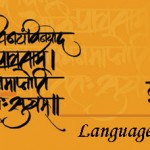When we were in high school, we were not exposed to studying Hindi subject. It was the third language but it was so neglected in our state that the pass mark for Hindi was fixed at 5% in the SSLC examination. Our Hindi teacher used to jokingly say that even if we copy the question paper in the answer sheet with few mistakes a pass was guaranteed. But today, Hindi occupies prime place in the state, where common folk never used to utter a word of the language, as it was considered as a language of the northern states being imposed on southern states.
In Hyderabad, a famous political leader, a Telugu speaking Baga Reddy was speaking fluent Urdu in his speeches that Urdu scholars used to praise. He is basically from a Telugu speaking family. When Telangana was liberated by India from Nizam, all the official correspondence was being carried out in Urdu (despite being a Telugu majority state). But the shift to English, Telugu was accomplished without much hassles.
Hindi, once the language branded as pure Northern language is now universally accepted as a language of India and our Prime Minister started delivering keynote addresses in foreign countries in the same language.
On a related note, I read a small story long back. One employee starts at home at 10 AM sharp, sit in a watch repair shop, after one hour ask the owner “Time Kya Hua Bhai”. He leaves for office, reaches at 11.30 AM, opens cupboards, arranges files and half hour later ask a co-employee, “Time Kya Hua Bhai”. He goes to canteen, sip tea, ask the counterman “Time Kya hua Bhai”, returns sits and relaxes and at lunch time, ask again “Time Kya Hua Bhai”. Leaves for lunch spends time till 2.30, comes back , sits till 3.30 and leaves office, goes to watch shop, sit an hour and ask “Time Kya Hua Bhai” and satisfied that that day’s time was up, leaves for home. This is because he knew only Urdu and could not do any work in either English or Telugu.
These anecdotes and story tell us a naked truth. If we think it fair and we have flair, we can learn any language. No language need be region specific or caste or religion specific. Language is used for communicating. There are 3,000+ languages in India, many of which do not have script. Dialects are understood by the local people. And, the same language, spoken in different regions of a state or in another part of country has a different dialect. Are we not learning? Then, why can not we teach and learn Sanskrit?
The issue came to the fore again after a “right wing nationalist” party took power in India and the HRD Ministry discontinued German as the third language and replaced it with Sanskrit. Left liberals, pseudo intellectuals, secular pseudos jumped on their feet and questioned the rationale of imposing the “right wing Hindu Nationalism” in the curriculum. The same groups did not fight when English was, by force, imposed on the nation by British colonialists that it was Christian oriented language. I have no grouse on English or any other language or religion. I am opposed to the hypocrisy.
Reasons given by these pseudos are:
1. Sanskrit is Brahminical language.
Who is a Brahmin as per Hindu scriptures? The one who attains Brahma Gnana is a Brahmin. By this rationale even 0.0001 per cent of Indians do not come under the category. Except the businessmen who own businesses and earn profit and live (these can be termed as Vaishyas) and military men who fight wars to defend us (these are Kshatriyas), rest of all of us Shudras, as we work for others. That is Varna Dharma. Castes are creation of subsequent feudal lords to retain supremacy over masses. Even Military men work for others, but benefit can be given due to their bravery. So, this stupid theory is debunked.
Those who say it is Brahminical forget Sage Valmiki was not a Brahmin but became one. Sage Viswamitra was not a Brahmin but became one, by attaining Brahma Gnana. Why not we all strive to attain the One Supreme Gnana?
2. That Sanskrit does not find you jobs anywhere in the world.
In how many nations, can we find jobs learning French, German, Chinese? This theory is thus debunked. Many European countries follow their own language and
still are employed. Why not we?
3. Sanskrit will take us back to the medieval ages. What about German? Is it modern? Or French? Is it too modern?
The whole opposition smacks of intolerance to whatever Hinduism stands for, either good or bad. Religion is faith. But Dharma is a way of life. By learning Sanskrit and the scriptures written in the language we can teach our children a way of life, that is better. In the process, if we find something bad in the way let us delete the same or teach not to practice like a superstition, that any way was not taught in scriptures. Instead, crying from rooftops, without allowing discussion is too immature and premature.
To Be Continued
Next Part: Let us know origin and history of the language and how many languages carry words in one form or other from Sanskrit, the Mother of all languages.
******************************************




![[Reprint Post] Reservations: Politics & Hypocrisy of Indian Elites](http://andhraportal.org/wp-content/uploads/2015/11/IndiaTvabc16a_LaluModi-150x150.jpg)



Great intro to a great series, Chandra gaaru. Thanks for writing on the topic. Looking forward to Part 2!
I am Meera completed three sanskrit exams conducted by samskritha Bharathi and I am now continuing my studies the fourth exam. I want to get more knowledge in sanskrit. Kindly send some important lessons and grammar exercises . I will send my answers through online Thank U
Hi Meera. Sorry but we don’t give lessons in Sanskrit here. Samskritha Bharathi we have heard is the best way to continue learning. A good way to supplement is through Sanskrit literature. These articles below have links to purchase books with original text and translation. Hope they help. Thanks for reading!
http://andhraportal.org/classical-indic-literature-i-literary-theory/
http://andhraportal.org/classical-indic-literature-ii-poetics/